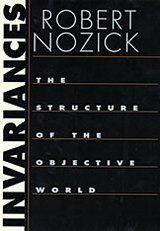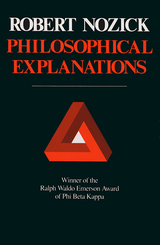
Recent scientific advances have placed many traditional philosophical concepts under great stress. In this pathbreaking book, the eminent philosopher Robert Nozick rethinks and transforms the concepts of truth, objectivity, necessity, contingency, consciousness, and ethics. Using an original method, he presents bold new philosophical theories that take account of scientific advances in physics, evolutionary biology, economics, and cognitive neuroscience, and casts current cultural controversies (such as whether all truth is relative and whether ethics is objective) in a wholly new light. Throughout, the book is open to, and engages in, the bold exploration of new philosophical possibilities.
Philosophy will never look the same. Truth is embedded in space-time and is relative to it. However, truth is not socially relative among human beings (extraterrestrials are another matter). Objective facts are invariant under specified transformations; objective beliefs are arrived at by a process in which biasing factors do not play a significant role. Necessity's domain is contracted (there are no important metaphysical necessities; water is not necessarily H2O) while the important and useful notion of degrees of contingency is elaborated. Gradations of consciousness (based upon "common registering") yield increasing capacity to fit actions to the world. The originating function of ethics is cooperation to mutual benefit, and evolution has instilled within humans a "normative module": the capacities to learn, internalize, follow norms, and make evaluations. Ethics has normative force because of the connection between ethics and conscious self-awareness. Nozick brings together the book's novel theories to show the extent to which there are objective ethical truths.

In this highly original work, Robert Nozick develops new views on philosophy’s central topics and weaves them into a unified philosophical perspective. It is many years since a major work in English has ranged so widely over philosophy’s fundamental concerns: the identity of the self, knowledge and skepticism, free will, the question of why there is something rather than nothing, the foundations of ethics, the meaning of life.
Writing in a distinctive and personal philosophical voice, Mr. Nozick presents a new mode of philosophizing. In place of the usual semi-coercive philosophical goals of proof, of forcing people to accept conclusions, this book seeks philosophical explanations and understanding, and thereby stays truer to the original motivations for being interested in philosophy.
Combining new concepts, daring hypotheses, rigorous reasoning, and playful exploration, the book exemplifies how philosophy can be part of the humanities.

One of the foremost philosophers of our time, Robert Nozick continues the Socratic tradition of investigation. This volume, which illustrates the originality, force, and scope of his work, also displays Nozick’s trademark blending of extraordinary analytical rigor with intellectual playfulness. As such, Socratic Puzzles testifies to the great pleasure that both doing and reading philosophy can be.
Comprising essays and philosophical fictions, classics and new work, the book ranges from Socrates to W. V. Quine, from the implications of an Israeli kibbutz to the flawed arguments of Ayn Rand. Nozick considers the figure of Socrates himself as well as the Socratic method (why is it a “method” of getting at the truth?). Many of these essays bring classic methods to bear on new questions about choice. How should you choose in a disconcerting situation (“Newcomb’s Problem”) when your decisions are completely predictable? Why do threats and not offers typically coerce our choices? How do we make moral judgments when we realize that our moral principles have exceptions? Other essays present new approaches to familiar intellectual puzzles, from the stress on simplicity in scientific hypotheses to the tendency of intellectuals to oppose capitalism.
As up to date as the latest reflections on animal rights; as perennial as the essentials of aesthetic merit (doggerel by Isaac Newton goes to prove that changing our view of the world won’t suffice); as whimsical as a look at how some philosophical problems might appear from God’s point of view: these essays attest to the timeliness and timelessness of Nozick’s thinking. With a personal introduction, in which Nozick discusses the origins, tools, and themes of his work, Socratic Puzzles demonstrates how philosophy can constitute a way of life.
READERS
Browse our collection.
PUBLISHERS
See BiblioVault's publisher services.
STUDENT SERVICES
Files for college accessibility offices.
UChicago Accessibility Resources
home | accessibility | search | about | contact us
BiblioVault ® 2001 - 2024
The University of Chicago Press









